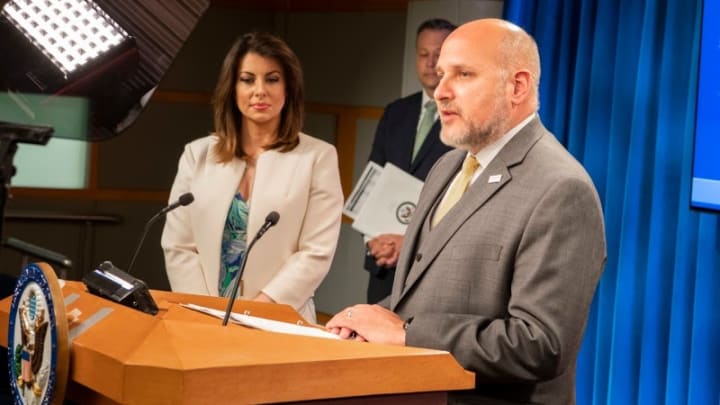
BURLINGTON, Vt. — John Barsa, acting administrator of the U.S. Agency for International Development, appeared before the House Foreign Affairs Committee on Thursday to discuss a White House budget proposal that was created before the coronavirus upended the agency’s programs and reshaped its priorities.
Barsa, whose appearance to discuss the budget was likened to “spotting a unicorn” by committee chair Rep. Eliot Engel, also faced a barrage of questions about the recent influx of political appointees at the agency whose past statements and positions have sparked an outcry among lawmakers and USAID’s own staff.
“There have been several recent management decisions under your leadership at USAID, and some of those are very troubling to myself and some of my colleagues,” Engel said.
The appointment of Merrit Corrigan as USAID’s newly-appointed deputy White House Liaison received the bluntest criticism, with Rep. Gregory Meeks, a Democrat from New York, referring to anti-LGBTQ and other comments she has made as bigoted. On Wednesday, ahead of the hearing, a group of House Democrats sent a letter to Barsa calling on Corrigan to resign and noting that neither Barsa nor the White House has demanded she retract statements “disparaging women, LGBTQ people, and immigrants.”
For Pro subscribers: Q&A: Mark Green on character-driven leadership
Devex speaks to the former USAID chief and new head of the McCain Institute for International Leadership about the pandemic, U.S. global health engagement, and the country's withdrawal from the World Health Organization.
In response to concerns about Corrigan and other recent controversial appointees, Barsa repeatedly offered a prepared statement affirming that “all USAID employees, regardless of hiring category, are held to the same high moral, legal and ethical standards that USAID has always had in place.”
The budget proposed by President Donald Trump included a cut of more than 20% to U.S. foreign aid compared to what Congress approved for 2020, but Barsa noted that proposal was created before the coronavirus emerged as the unprecedented global health and development threat facing the world today.
Barsa could not commit to providing lawmakers with an updated budget proposal reflecting increased need due to the pandemic, nor could he say how much funding USAID might require from a supplemental spending package, citing discussions taking place between the White House and the Office of Management and Budget. Barsa did note that he has created a new task force inside USAID known as “Over the Horizon” to examine what kinds of support USAID’s partner countries might require in light of the pandemic.
With the 2020 fiscal year in its final quarter, Engel raised concerns about the Trump administration’s repeated attempts to rescind unspent USAID funding, and noted that “policy indecision and extra layers of bureaucracy” in USAID’s COVID-19 response efforts have hampered funding disbursement this year.
“I’m happy to say as a learning organization we have improved our processes for getting money out the door expeditiously,” Barsa said, adding that USAID expects to have all of its expiring funds obligated by the end of the fiscal year.
The acting administrator also faced questions about USAID’s role in ensuring access to an eventual COVID-19 vaccine, particularly given the U.S. government’s absence from a major vaccine summit in March and the lack of any funding commitment targeting global vaccine access from the U.S. so far.
“What we need here is a clear commitment from the administration. You have it from Democrats. You have it from Republicans, including strong supporters of President Trump on Capitol Hill. We want to do our share, and right now my sense is that we are getting resistance — not from USAID, but from the White House,” said Rep. Tom Malinowski, a Democrat from New Jersey and former assistant secretary of state.
Barsa pointed to the U.S. government’s investments in global health infrastructure around the world, prompting Malinowski to point out these are past investments unrelated to a specific commitment to COVID-19 vaccine access.
“Our generosity is ongoing and continuing,” Barsa added.
“And we’ve pledged nothing,” Malinowski responded.




